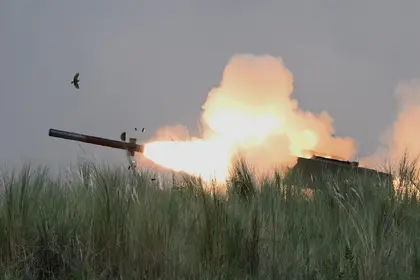President Volodymyr Zelensky fired the head of his personal security detail on Thursday, a few days after a secret plot among two of the department’s officers to assassinate him was uncovered.
The chief bodyguard, Sergiy Leonidovich Rud, was removed from his post via presidential decree. A replacement has not yet been named.
JOIN US ON TELEGRAM
Follow our coverage of the war on the @Kyivpost_official.
Two colonels in the department are being detained on suspicion of collaborating with Russia’s security service, the FSB, after an investigation by Ukraine’s Military Intelligence (HUR) and the Security Service of Ukraine (SBU).
The plot included eliminating HUR chief Kyrylo Budanov before Easter. The plan allegedly was to recruit a Ukrainian agent who would relay information to the FSB about the movements of certain individuals, including Zelensky, and then launch a missile strike on the target’s residence. That would be followed by a drone attack on those remaining, while a second missile strike was intended to destroy evidence of the drone’s use.
One of the colonels, it is alleged, had personally provided drones and other munitions to a local agent to carry out the attacks.
Rud had overseen the department for about five years. Zelensky said last year that there had been at least “five or six” foiled plots against him of which he was made aware.
Pentagon vows to shut down Russia’s exploitation of Starlink satellite network

‘We Need to Support People Now’ – Zelensky Reacts to Trump’s Aid Freeze, Looks to Europe for Help
The US Assistant Secretary of Defense for Space Policy, John Plumb, told Bloomberg News in an interview published Thursday that the Pentagon has been “heavily involved in working with the government of Ukraine and SpaceX to counter Russian illicit use of Starlink terminals.”
Satellites launched by the private company SpaceX, founded by tech billionaire Elon Musk, make up the Starlink network, whose terminals are used by entities around the world. In February, Ukrainian military intelligence had discovered that the Kremlin was paying the owners of terminals in the Arab world to use them.
Shortly thereafter, a group in the US House of Representatives launched an investigation, and the Department of Defense has been working with Ukraine and SpaceX to counter the Russian illicit use ever since. Plumb declined to offer any specifics on these operations.
“At this time we have successfully countered Russian use, but I am certain Russia will continue to try and find ways to exploit Starlink and other commercial communications systems,” Plumb said.
In Washington, the German Defense Minister announces the purchase of artillery systems for Ukraine
On a visit to Washington on Thursday, Germany’s Defense Minister, Boris Pistorius, told journalists that his country will purchase artillery systems from US military stockpiles to send to Ukraine.
“I can confirm that in cooperation with the Americans, we will provide Ukraine with three HIMARS systems,” Pistorius said. There was no timetable discussed for their delivery.
On his US visit, the defense minister was slated to have meetings with Pentagon officials and with UN Secretary-General António Guterres in New York.
Germany has been criticized by some European peers for being slow to approve the transfer of its long-range Taurus missiles to Ukraine, capable of reaching far within Russian territory.
“Ukraine will abide by any restrictions you put on them. So you could give them Taurus [missiles]. And you could add all sorts of restrictions about where you want it used or not used,” the former British Defence Secretary Ben Wallace said in late April.
UPDATE — A spokesperson for HENSOLDT confirmed to me that the contract for the six TRML-4D was concluded with the Ukrainian Ministry of Defence and is paid for by the German government. pic.twitter.com/5CvIQ2k0e3
— German Aid to Ukraine (@deaidua) May 3, 2024
Ukraine hits Krasnodar, Bashkorostan oil depots
The SBU on Thursday said that Ukrainian forces attempted to strike oil depots and refineries in the Russian region of Krasnodar and the Republic of Bashkortostan with long-range attack drones, according to the Institute for the Study of War (ISW).
The Krasnodar regional operational headquarters claimed that Ukrainian forces tried to hit an oil depot in Yurovka with at least seven drones and that Russian air defense suppressed six of them. At least one fell on the depot itself, igniting the building. Several Kremlin-friendly sources reported that the strike damaged several oil tanks.
According to ISW analysts, “Radio Free Europe/Radio Liberty (RFE/RL) reported that an ‘informed source’ stated that this was an SBU operation targeting oil shipment points through which the Russian military supplies oil to troops in occupied Crimea.”
Geolocated footage from Thursday indicates that a drone attack against the Gazprom Neftekhim Salavat oil refinery in Salvat, Republic of Bashkortostan; information confirmed by the Republic of Bashkortostan’s Ministry of Emergency Situations. It reported that the strike damaged the building housing a pumping station at the refinery.
/2. Location of the oil refinery.
— Special Kherson Cat 🐈🇺🇦 (@bayraktar_1love) May 9, 2024
(53.4092820, 55.8868303) pic.twitter.com/5NRJjelNrw
You can also highlight the text and press Ctrl + Enter













